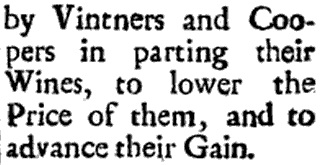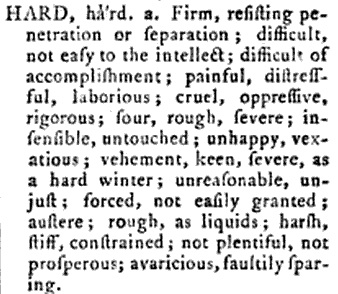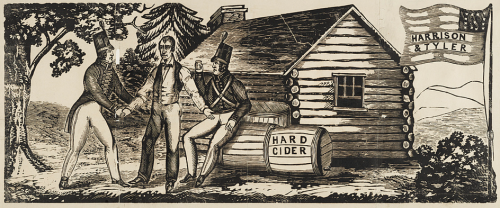In the last two posts we looked at the etymology of the word cider and the various spellings of cider in English. This post will look at the meaning of the “hard” in hard cider.
In 1840 presidential candidate William Henry Harrison ran his “Log Cabin & Hard Cider” Campaign. Essentially he claimed he was raised in a humble a log cabin drinking common cider.
While his campaign claims weren’t accurate, the campaign was a success on several levels. Harrison became the 9th president and the term “hard cider” became more common in American English. It’s now so firmly embedded in our language that today it’s what we call almost all fermented apple juice. Americans are the only ones in the English-speaking world to use that term. Everywhere else it’s just called cider. Early Americans left off the hard too. From the earliest settlement through the nineteenth century it was simply called cider. So when did it get to be “hard”?
As it turns out, “hard cider” isn’t originally American. It appears to be British. The earliest reference to “hard cider” found so far is in the 1690 A New Dictionary of the Terms Ancient and Modern of the Canting Crew dictionary, printed in London. It’s in the definition for Freeze, which is


Freeze is cheap cider used to adulterate good wine. This definition is repeated verbatim in British dictionaries throughout the eighteenth century, including
A New Canting Dictionary, 1725
The New Universal English Dictionary, 1761
The New Universal Etymological English Dictionary, 1775
A Classical Dictionary of the Vulgar Tongue, 1785
Blackguardiana; or, a Dictionary of Rogues, Bawds, &c., 1795
The definition for freeze, being “thin, small, hard” is curious. Since cider at that time always meant alcoholic apple juice, those words seem to be describing the character of cider. In looking up other early definitions for “hard” one finds the usual definition of firmness. Some dictionaries, though, defined it as rough. A few even defined it as a rough characteristic of drinks.
A New English Dictionary, John Kersey’s 1739 dictionary, defines hard as

Samuel Johnson’s 1755 A Dictionary of the English Language has several definitions for hard, including


In 1789 Thomas Sheridan in his A Complete Dictionary of the English Language defined hard as

Noah Webster’s 1828 An American Dictionary of the English Language not only defines hard as a character of liquors, he uses cider in his example sentence:

According to these definitions the “hard” in hard cider has nothing to do with alcohol content, but with taste.
Hard cider doesn’t appear in American records until 1786, when The New-York Packet included it in a cure for dropsy (an archaic term for edema).(1)
![New-York Packet, published as Loudon's New-York Packet (New York, New York) • 02-02-1786 • Page [2]](https://pommelcyder.files.wordpress.com/2018/02/new-york-packet-published-as-loudons-new-york-packet-new-york-new-york-e280a2-02-02-1786-e280a2-page-2.png?w=500)
- New-York Packet, published as Loudon’s New-York Packet (New York, New York) • 02-02-1786 • Page [2]
After the Packet published it in 1786, “hard cider” only occasionally appeared in print over the next forty years. When it did, the story suggests the cider is low-quality.(2) For example, in 1790, when a resident of Charleston, South Carolina realized the state capital would remain in Columbia, he worried that Charlestonians would be reduced to a less civilized lifestyle, including having only hard cider to drink.

- Daily Advertiser, published as The Daily Advertiser (New York, New York) • 06-11-1790 • Page [2]
The overall tone of John Woodger’s 1804 obituary suggests he preferred an exceedingly unrefined lifestyle, appropriately choosing hard cider over everything else.

- Poulson’s American Daily Advertiser, published as Poulson’s American Daily Advertiser. (Philadelphia, Pennsylvania) • 12-27-1804 • Page [3]
Why use good cider for vinegar making when hard “cyder” would be less expensive, as Jona Rogers advertised in 1826.
![Baltimore Patriot, published as BALTIMORE PATRIOT & MERCANTILE ADVERTISER. (Baltimore, Maryland) • 06-09-1826 • Page [3]](https://pommelcyder.files.wordpress.com/2018/02/baltimore-patriot-published-as-baltimore-patriot-mercantile-advertiser-baltimore-maryland-e280a2-06-09-1826-e280a2-page-31.png?w=500)
- Baltimore Patriot, published as BALTIMORE PATRIOT & MERCANTILE ADVERTISER. (Baltimore, Maryland) • 06-09-1826 • Page [3]
This fictional 1830 humorous piece calls hard cider “dreadful.”
![Haverhill Gazette, published as Essex Gazette (Haverhill, Massachusetts) • 04-10-1830 • Page [3]](https://pommelcyder.files.wordpress.com/2018/02/haverhill-gazette-published-as-essex-gazette-haverhill-massachusetts-e280a2-04-10-1830-e280a2-page-3.png?w=500)
- Haverhill Gazette, published as Essex Gazette (Haverhill, Massachusetts) • 04-10-1830 • Page [3]
One ne’er-do-well trader included hard cider among his limited and poor stock.
![North American, published as The North American (Philadelphia, Pennsylvania) • 04-17-1839 • Page [1]](https://pommelcyder.files.wordpress.com/2018/02/north-american-published-as-the-north-american-philadelphia-pennsylvania-e280a2-04-17-1839-e280a2-page-1.png?w=530&h=295)
- North American, published as The North American (Philadelphia, Pennsylvania) • 04-17-1839 • Page [1]
This understanding of “hard” as rough, sour, or acidic adds a new layer to understanding Harrison’s campaign. He didn’t simply claim to drink cider. He claimed to drink the cheapest, harshest cider, just like the people did who he appealed to.(3)
![New Hampshire Patriot and State Gazette (Concord, New Hampshire) • 02-10-1840 • Page [2]](https://pommelcyder.files.wordpress.com/2018/02/new-hampshire-patriot-and-state-gazette-concord-new-hampshire-e280a2-02-10-1840-e280a2-page-2.png?w=500)
New Hampshire Patriot and State Gazette (Concord, New Hampshire) • 02-10-1840 • Page [2]
************************************
- As the image shows, they reprinted this from the Albany Gazette. A copy of that has yet to be located. However, it began publication in 1784, not long before the Packet reprinted the cure.
- Following their original publication, the dropsy cure and the Mr. Longswallow piece were repeatedly reprinted in various American papers over several years. I chose not to include each reference to them here.
- Like hard, the word cabin had a specific meaning too. It meant a one-room structure.

